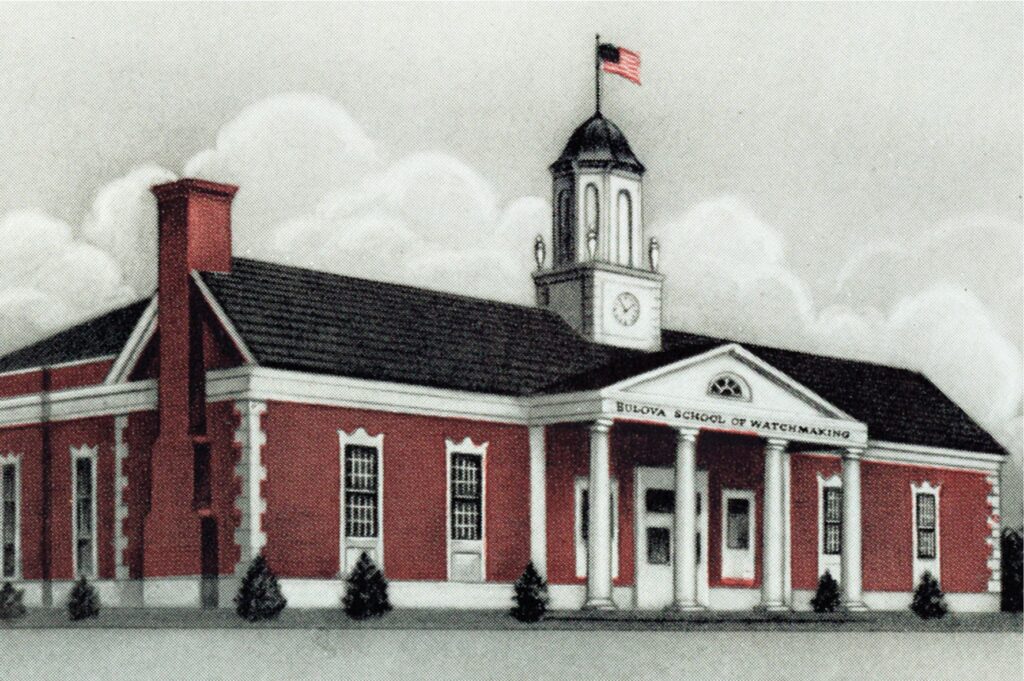The Joseph Bulova School of Watchmaking

When the Second Great War ended in the 1940s, a massive wave of drafted soldiers made their way back home to rejoin civilian life. With the workforce ready to accept new recruits in horology—Bulova stepped up to the proverbial plate to get ex-servicemen to work. Beginning in 1945, right at the end of WWII, the Joseph Bulova School of Watchmaking opened its doors to disabled veterans. Bulova’s new non-profit sought to give these disabled fighters a trade in a massively popular international industry. Though the organization was named after its founder, it was Joseph Bulova’s son Arde who opened the non-profit to America’s returning soldiers (Arde acting as chairman of the board at the time). While the school itself is no longer around, its mission evolved beyond watchmaking and still carries a legacy today.
Building
the Means
Bulova itself has been owned by the Citizen watch group since 2007. However, before the company became a legacy brand, it was making great strides on its own in the American watch market. Boasting high accuracy and gaining steam at the rise of the radio and television era, Bulova dropped the first commercial radio and television advertisements in U.S. history (more on that in a new blog coming soon). This widespread fame and popularity built Bulova up as a watchmaking giant. Their television ad was released in 1941 and from there Bulova was solidified in the American consciousness. Increased revenue and high-calibre watchmaking gave the company the means to give back to wounded soldiers from the war effort, upon their return.
Disabled vets at the
school learned an invaluable skill set with expert supervision and well fleshed
out literature to boot. Skills learned via the manual include staking balance
wheels, truing the balance wheel, hairspring truing, stem making, watch
assembly and train wheel assembly. Above all, disabled vets were trained beyond
their combat skills to give time back to the world they fought to protect.
Their skills translated to jobs in the industry that ultimately kept American
timekeeping a tour-de-force in the global market.
Where
it Stands Today

Watchmaking for veterans is still continued by Veterans Watchmaker Initiative (VWI). This organization exists because the Joseph Bulova School of Watchmaking closed its doors in 1993—but its impression was felt in the greater ex-military community. VWI’s mission is to pick up where the J.B. School of Watchmaking left off, with modern updates (i.e. quartz, updates in mechanical timekeeping, etc…). Bulova’s school went above-and-beyond the call of duty in its own right by equipping its building with wheelchair access before it was standard to do so. Their non-profit endeavors for veterans eventually included full rehabilitation services, national advocacy for disabled people as a whole, and funding for the first wheelchair sports. If this aspect of American watchmaking interests you or someone you know VWI may be worth investigating. Their efforts reach out in a similar fashion.
If you’re interested in peering back at the J.B. School of Watchmaking first-hand, the physical location still stands in Woodside Queens, NYC. It has since become an LDS (Mormon) Church—without much alteration to its original construction. Furthermore, 13th editions of the J.B. School of Watchmaking training manuals still sell online for around $150. These manuals were the key to at-home study for all veterans who passed through Bulova’s school halls. Owning this literature is a fine way to engage with the language of watchmaking, at a time when Bulova was putting in work for America’s returning soldiers.
A Final Thought
Watchmaking itself, its innovations and history, are directly tied to war and the lives of veterans. Many timepieces have been handed down from generation to generation as snapshots—harboring lifelong stories from both on-and-off the battlefield. It’s easy to see events in timekeeping history as snippets suspended in some resting version of the past. However, watchmaking and timekeeping are unifying human trends that persist—and continue to school all of us on how time truly impacts all of our lives.
Times Ticking has been in operation for more than 30 years, since 1982. We have performed watch repair for customers both locally and internationally. If it Ticks! We KNOW it! Our team of watch repair technicians have a combined experience in watchmaking of over 120 years.

